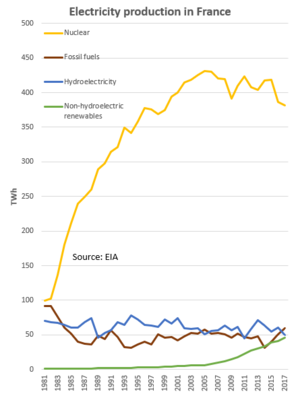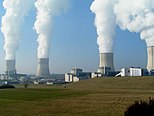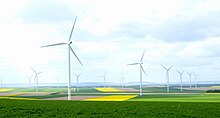Energy in France
This article's lead section may be too short to adequately summarize the key points. (May 2019) |

Energy in France is generated from 5 primary sources: coal, natural gas, liquid fuels, nuclear power, and renewables. In 2020, nuclear power made up the largest potion of electricity generation, at around 78%, while renewables accounted for 19.1%.[1] France has the largest share of nuclear electricity in the world.[2] The country is also among the world's biggest net exporters of electricity. The country is increasingly investing in renewable energy and has set a target of 32% by 2030.[3]
Overview[]
| Population million |
Prim. energy TWh |
Production TWh |
Import TWh |
Electricity TWh |
CO2-emission Mt | |
|---|---|---|---|---|---|---|
| 2004 | 62.2 | 3,200 | 1,598 | 1,633 | 478 | 387 |
| 2007 | 63.6 | 3,067 | 1,575 | 1,580 | 481 | 369 |
| 2008 | 64.1 | 3,099 | 1,589 | 1,621 | 494 | 368 |
| 2009 | 64.5 | 2,980 | 1,506 | 1,563 | 483 | 354 |
| 2012 | 65.1 | 2,940 | 1,582 | 1,470 | 476 | 328 |
| 2012R | 65.4 | 2,935 | 1,564 | 1,444 | 482 | 334 |
| 2013 | 65.9 | 2,946 | 1,585 | 1,442 | 486 | 316 |
| Change 2004-2013 | 5.9% | -7.9% | -0.01% | -11.7% | 1.7% | -18.4% |
Mtoe = 11.63 TWh, Prim. energy includes energy losses that are 2/3 for nuclear power[5] 2012R = CO2 calculation criteria changed, numbers updated
| Diesel | Gasoline | Natural gas | Coal | Electricity | ||
|---|---|---|---|---|---|---|
| per unit | liter | liter | m3 | MWh | tonne | MWh |
| Excise | 0.481 | 0.631 | 2.64 | 19.5 | ||
| Environment | ||||||
Electricity[]


|

|

| |
| Left: The Cattenom nuclear power station near Luxemburg Right: Wind power in France; wind turbines in Lower Normandy Bottom: The Cruas nuclear power plant at night. | |
The electricity sector in France is dominated by nuclear power, which accounted for 72.3% of total production in 2016, while renewables and fossil fuels accounted for 17.8% and 8.6%, respectively.[7] France has the largest share of nuclear electricity in the world. The country is also among the world's biggest net exporters of electricity. The French nuclear power sector is almost entirely owned by the French government and the degree of the government subsidy is difficult to ascertain because of a lack of transparency.[8]
In 2010, as part of the progressive liberalisation of the energy market under EU directives, France agreed the Accès régulé à l'électricité nucléaire historique (ARENH) regulations that allowed third party suppliers access up to about a quarter of France's pre-2011 nuclear generation capacity, at a fixed price of €42/MWh from 1 July 2011 until 31 December 2025.[9][10][11]
Companies[]
Électricité de France (EDF) is the main electricity generation and distribution company in France. It was founded on April 8, 1946 as a result of the nationalisation of a number of electricity producers, transporters and distributors by the Communist Minister of Industrial Production Marcel Paul. Until November 19, 2004 it was a government corporation, but it is now a limited-liability corporation under private law (société anonyme). The French government partially floated shares of the company on the Paris Stock Exchange in November 2005,[12] although it retains almost 85% ownership as of the end of 2007.[13]
EDF held a monopoly in the distribution, but not the production, of electricity in France until 1999, when the first European Union directive to harmonize regulation of electricity markets was implemented.[14]
EDF is one of the world's largest producers of electricity. In 2003, it produced 22% of the European Union's electricity, primarily from nuclear power:
- nuclear: 74.5%
- hydro-electric: 16.3%
- thermal: 9.1%
- wind power and other renewable sources: 0.1%
A report was published in 2011 by the World Energy Council in association with Oliver Wyman, entitled Policies for the future: 2011 Assessment of country energy and climate policies, which ranks country performance according to an energy sustainability index.[15] The best performers were Switzerland, Sweden, and France.
Renewable energy[]

With growing installed wind and solar power capacity, on top of preexisting hydroelectric facilities, renewable energy rose to provide 23% of France's national electricity consumption in 2019.[16]
Government policy aims to increase renewable energy use; in 2015, the French parliament passed a comprehensive energy and climate law that includes a mandatory renewable energy target requiring 40% of national electricity production to come from renewable sources by 2030.[17] A related provision of the 2015 law was the planned reduction of nuclear energy's share in power production from 75% (2016-2017 data) to 50% by 2025, but this was later delayed by ten years, to 2035, over concerns of carbon emissions, energy security, and employment.[18][19]
See also[]
| Wikimedia Commons has media related to Energy in France. |
- Electricity sector in France
- Nuclear power in France
- Renewable energy in France
- Électricité de France (EDF)
References[]
- ^ Bauer-Babef, Clara (2021-05-06). "France trailing behind EU renewable energy goals". www.euractiv.com. Retrieved 2021-09-09.
- ^ "Nuclear Share of Electricity Generation in 2018". IAEA. Retrieved 26 October 2019.
- ^ "Renewable Energy In France; What You Should Know". Hive Power. 2021-06-07. Retrieved 2021-09-09.
- ^ IEA Key World Energy Statistics Statistics 2015, 2014 (2012R as in November 2015 + 2012 as in March 2014 is comparable to previous years statistical calculation criteria, 2013, 2012, 2011, 2010, 2009 Archived 2013-10-07 at the Wayback Machine, 2006 Archived 2009-10-12 at the Wayback Machine IEA October, crude oil p.11, coal p. 13 gas p. 15
- ^ Energy in Sweden 2010 Archived October 16, 2013, at the Wayback Machine, Facts and figures, The Swedish Energy Agency, Table 8 Losses in nuclear power stations Table 9 Nuclear power brutto
- ^ Michel, Sharon. ENERGY PRICES AND TAXES, COUNTRY NOTES, 3rd Quarter 2015 Archived January 19, 2016, at the Wayback Machine, page 34. International Energy Agency, 2015
- ^ National yearly power generation by source, Réseau de Transport d'Électricité (Electricity Transmission Network Company) Open Data.
- ^ Al Gore: Our Choice, A plan to solve the climate crises, Bloomsbury 2009 page 156
- ^ Stefan Ambec; Claude Crampes (16 January 2019). "Regulated Access to Incumbent Nuclear Electricity". Florence School of Regulation, European University Institute. Retrieved 4 June 2020.
- ^ "EDF terminates nuclear electricity supply contracts". World Nuclear News. 3 June 2020. Retrieved 4 June 2020.
- ^ Fabrice Fages; Myria Saarinen (2019). "France". In David L Schwartz (ed.). The Energy Regulation and Markets Review. Law Business Research. ISBN 978-1-83862-032-5. Retrieved 4 June 2020.
- ^ Bennhold, Katrin (21 November 2005). "EDF shares fail to light up market". International Herald Tribune. Retrieved 2008-07-11.
- ^ "Shareholding policy". Électricité de France. 31 December 2007. Archived from the original on 9 July 2012. Retrieved 2008-07-11.
- ^ Directive 96/92/EC of the European Parliament and of the Council of 19 December 1996 concerning common rules for the internal market in electricity (L27, 30.01.1997, p. 20)
- ^ "Archived copy". Archived from the original on 2011-11-20. Retrieved 2011-11-17.CS1 maint: archived copy as title (link)
- ^ "Renewables share in power consumption hits 23% in France in 2019". Renewables Now. 2020-02-11. Retrieved 2020-08-26.
- ^ Tara Patel (2015-07-22). "France to Adopt Law to Cut Nuclear Dependency, Carbon Emissions". Bloomberg News. Retrieved 2015-07-23.
- ^ Geert De Clercq, Michel Rose (2017-11-07). "France postpones target for cutting nuclear share of power production". Reuters. Retrieved 2020-08-26.
- ^ Sophie Louet, Sarah White (2018-11-18). "France to cut nuclear energy reliance by 2035: minister". Reuters. Retrieved 2020-08-26.
- Energy in France
- Energy by country in the European Union
